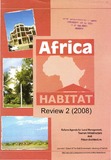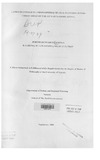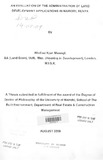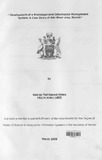Location
Our Vision is to be a world-class university committed to scholarly excellence.
Our Mission is to provide quality university education and training and to embody the aspirations of the Kenyan people and the global community through creation, preservation, integration, transmission and utilization of knowledge.
Core Values
In order to realize the above vision and mission, certain shared values shall be nurtured. There is great need for the University to be guided by the right values derived from the virtues and moral standards of the Kenyan and wider society.
Core Functions
Teaching and Learning: The university offers innovative , relevant and market driven academic programmes , both at undergraduate and postgraduate levels with inbuilt quality control systems the university also provides an environment and policy framework for undertaking high quality and relevant research
Members:
Resources
Displaying 166 - 170 of 298Rahani: A Unique Commercial Land Tenure Arrangement Amongst the Digo of Kenya's Coast
Land ownership, distribution, utilisation and exchange amongst the Oigo people of Kenya's lower Coast is done through both formal systems and informal
arrangements. 'Rahani'is an informal arrangement that allows landowners to rent out their excess or idle land at a price over an uncertain duration. Using
data from several classes of respondents, this paper found that landowners practice 'rahani'to get quick money to attend to immediate domestic, personal
Gender, Rights and Development: An East African Perspective
The article problematises legal issues surrounding women's rights to land and related resources. It avers that in a plural legal context, there is need to engage all forms of law if law is to be an effective medium for challenging gendered notions of access to, control over and ownership of property. This is a key challenge in East African countries seeking to frame property and natural resource policies and laws that promote development
Land -use Conflict and in-optimal Spatial Patterns in Peri-urban Areas of the City of Nairobi,Kenya
Land -use Conflict and in-optimal Spatial Patterns in Peri-urban Areas of the City of Nairobi,Kenya
An evaluation of the administration of land development applications in Nairobi, Kenya
The study was undertaken in order to investigate the management approaches used by the institutions dealing with approvals of land development applications and assess the impacts of such management approaches on the land development applications approval processes
Development of a Prototype Land Information Management System
This study addresses certain aspects of data modeling with respect to Geographic
information systems (GIS). The primary objective of this project is an attempt to
develop an automated Land Information Management System (LIMS). In Kenya today,
land information is held mostly in paper form, managed manually and even the paper
records themselves are not optimally organized. The process of retrieving and
disseminating this information is inefficient, time consuming and cannot support timely
decision making.






